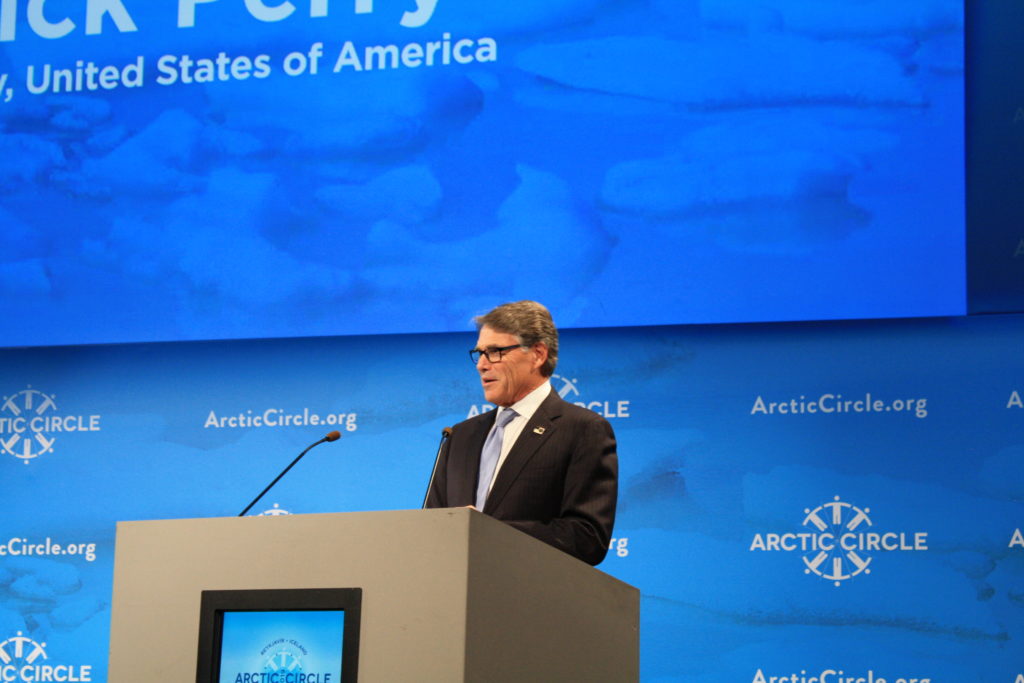U.S. Energy Secretary Perry praises Arctic oil and gas potential, while emphasizing energy geopolitics
Rick Perry, the head of the U.S. Department of Energy, highlighted natural resources available in the Arctic while pushing back against non-Arctic influences in the region.

On Thursday at the Arctic Circle Assembly in Reykjavik, when U.S. Secretary of Energy Rick Perry spoke about U.S. Arctic energy investments, he included the development of renewable resources and microgrids in Alaska.
But he grew most animated when he talked about the potential for natural resources like oil and natural gas.
“By any measure, the Arctic region is brimming with the incredible opportunity of economics and its energy potential,” he said. According to a 2008 estimate from the U.S. Geological Survey, the Arctic may contain one-third of the world’s undiscovered oil and gas reserves, he pointed out.
“We’re convinced that they can be responsibly explored — they can be developed for the benefit of Arctic peoples and communities and ultimately the world,” he said, addressing the region’s policymakers and researchers at the annual Arctic conference in Iceland.
The remarks were in jarring contrast to many of the other speakers, who emphasized efforts to curb emissions and reduce the worst impacts of climate change on a rapidly changing Arctic.
But the Trump administration has made Arctic energy a key part of its plans. In September, the U.S. Department of Interior announced plans to accept bids for oil leasing in the entire coastal plain of Alaska’s Arctic National Wildlife Refuge — a move U.S. President Donald Trump has claimed as one of his top accomplishments. In Iceland, Perry also highlighted work around potentially exploiting methane hydrates — known as the “ice that burns” — in Alaska’s North Slope.
The Department of Energy has also focused on renewable energy, particularly in the Arctic. Microgrids in remote communities in Alaska are increasingly powered by small-scale hydroelectric, wind and solar projects. In fact, the U.S. is the world’s second-biggest generator of wind and solar energy, Perry said. That’s true; according to the International Renewable Energy Agency, the United States produced 145,745 MW of wind and solar energy in 2018. The number-one producer of wind and solar energy was China — with more than double the U.S. output, at 359,728 MW.
Perry also claimed that total greenhouse-gas emissions from the United States fell “dramatically” between 2005 and 2018. That is less true; while emissions did decline for a time, they rose again in 2018 — the last year for which we have complete data. The 3.4 percent increase in 2018 was the second-largest in 20 years.
Perry also turned his attention from Alaska to the wider Arctic region, where he framed energy development in the terms of geopolitical competition — with a pointed rebuke for non-Arctic nations seeking a foothold in the region, such as China.
“As I look to the future, I see us successfully resisting those countries seeking to dominate the Arctic from the outside,” he said, in a veiled reference to China, which has declared itself a “near-Arctic” nation. “I see us unleashing an energy supply to liberate nations outside the Arctic from dependence on those same countries, which would wield their power, their energy in particular, as a geopolitical weapon.” It wasn’t immediately clear if the last remark was also aimed at China, which is not a major energy exporter. The Trump administration has also criticized Russia, which is not an outsider to the Arctic, for its energy diplomacy and actions in the region.
Perry’s remarks echo similar statements criticizing Russia and China from U.S. Secretary of State Mike Pompeo, in a speech ahead of the Arctic Council ministerial meeting this spring, and more recently, from President Trump, in a joint conference with Finnish President Sauli Niinistö.
In a speech that at times sounded like a stump speech, Perry concluded that “tomorrow belongs to the North, and the future belongs to the free.”
The call for Arctic nations to band together against these outside influences was a striking shift from past U.S. policies toward the Arctic, which have largely been lacking, experts say.
As Alaska Sen. Lisa Murkowski, long a champion for pan-Arctic collaboration, said in an event the next day about U.S. involvement in the region: “It’s about darn time.”
In the past, she said, she has struggled to show others in Washington the importance of engaging in the Arctic. That’s beginning to change now, she said. “They’re coming to the party a little bit late, but at least they’re coming.”
Mike Sfraga, director of the Polar Institute at the Woodrow Wilson Center in Washington, D.C., agreed. “With Secretary Perry coming here, it’s a very positive thing,” he told ArcticToday. “I think more cabinet members should be engaged in the Arctic.”
The rest of the world wants to know what the United States thinks about the region, he said.
As for the remarks aimed at non-Arctic states such as China, Sfraga urged for more action instead of rhetoric.
“I don’t think we need to spend time thinking about how we exclude others,” he said. “I think we should be inclusive, and we should lead that inclusive club.”